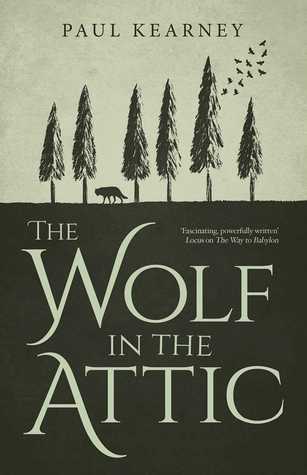The Wolf in the Attic by Paul Kearney

I've given this 5 stars on Goodreads for its writing, which is lovely, but I do have ambivalent feelings about it. Not enough to stop me recommending it, albeit with caveats - in fact, I'll be interested to see what other people think. One of the reasons I liked it so much is that the author, Paul Kearney, is obviously crazy about mythology, and loves to feel the weight of myth behind everyday life.
Anna, his heroine, is a creature from myth herself, in a way, emerging from the wreck of Greece, her mother killed by Turkish soldiers on the beach in a conflict that seems to reverberate through history (or have I just copy-edited too many books about Turkey?). Anna and her father escape to Oxford where his political activism becomes more and more an act of desperation, driving him to drink and to neglect of Anna. Her only real companion is the doll she brought from Greece, and too poor to find any other pastime, she wanders the streets of the city alone.
It's at this point that one of the things I feel uneasy about happens - Anna meets, and is befriended by, C.S. Lewis. I can entirely see that Kearney admires Lewis immensely, and wants to pay tribute (Tolkien appears too), but the encounters lend very little to the narrative or to the sense of place. It's nice, and young readers may enjoy it, but it's not necessary. Neither man is very important to the rest of the book, except possibly as an ideal of the world of stability and kindness which Anna loses when she is forced to flee for a second time, and alone. On the other hand, I notice that in an interview the author said that he didn't feel he could write about 1920s Oxford without including Lewis. Hmm, well maybe... but I'm not entirely convinced.
[Spoiler alert]
I also wasn't entirely persuaded by Anna's reasoning when she leaves home - why doesn't she go to Lewis? In plot terms, of course she can't, the book would be a novella with an implausibly happy ending. But a real-life Anna? I think she might have done.
Once she's left home, my other problem arises: the second half was marred for me by the depiction of the Romani. When they were revealed to be evil I was acutely uncomfortable; I've spent far too much of my life arguing with people who want to treat any kind of travelling people as pariahs. If the author doesn't share those racist views then I seriously question his choice here. Similarly, the celebration of Englishness and English myth felt just a little too nationalistic, although that may have been simply because I was already becoming uneasy. However, I did very much like the linking of the archetypal characters with the Ridgeway, a landscape rich in legend. Here, Kearney's writing reminded me a little of Mark Chadbourn (Age of Misrule series), although with nothing like the complexity! It may well be that those who liked the latter would enjoy Wolf in the Attic.
So, a recommendation with reservations - unusual for me, since I tend mainly to enthusiastic reviews. Is this a case of good writing marred by doubtful ethics? Or am I being over-sensitive? But this does feel like a book aimed at the younger reader, and if that's your audience, I feel you need to get your politics firmly in order. Nice cover though.


Comments
Post a Comment